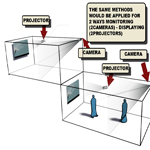LabScape
Passive Surveillance with Organic Design
 | Supervisor: Participants: Subjects: |
Universities usually provide a broad set of offices and laboratories spread across a potentially large campus area. Students and staff members typically perform many activities in different rooms like lecture halls, seminar rooms, laboratories, etc. during daily routine. Due to parallel performances, large distances and privacy issues of closed event situations, it is inherently difficult for university members to get an overview of the current campus-wide activities. Whereas in public spaces, where active surveillance systems are constantly growing and city-wide observation system for tracking suspect persons are supported by the police and the government in order to prevent crime and terror activities, in private spaces of closed communities, like a university campus, privacy concerns would prohibit the deployment of equivalent systems.
From our point of view, the availability of pervasive, unobtrusive tracking technology, ubiquitous computing infrastructure and new enhanced digital media interfaces can be used to realize a more passive surveillance, which protects the privacy of individuals and uses abstraction and anonymisation to realize an ambient awareness system for campus activities. An organically designed system supposes the use of real-time generated graphics or sounds of a particular aesthetic, for the mapping of complex data bodies to qualitative parameters that are closer to human understanding and intuition. This offers both computational and communication advantages: By using algorithmic descriptions of organic structures to reflect data values in terms of form, color and movement, we are able to reduce the need for complex data display in classical forms like tables and text, thus entering a more visual, audible and intuitive level of communication. Mapping subtle changes in a building's flow of activity doesn't convey concrete nor explicit information about a particular subject, but it gives an increased level of awareness about vital, social and environmental processes, while giving accurate translations of data to visual parameters that can be more easy to perceive and experience than numerical output.
More information can be found at:
- Project Page
- Luis Bustamante, Mantas Talmantas, Rangga Winantyo and Andreas Schrader
LABSCAPE - Organic Landscape for Ambient Awareness in Campus Laboratories
1st Workshop on Ubiquitous Media Entertainment Technology at MindTrek'2007
Helsinki, Finlan, October 2, 2007.
